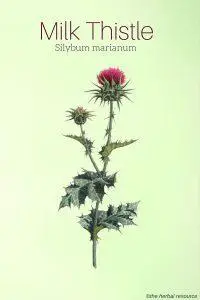In Germany the plant is often depicted as a religious symbol associated with the Virgin Mary; the species name “marianum” honors this symbolic association. According to popular legend, the milky white fluid that comes from the leaves when crushed is the milk of the Virgin Mary.
The active constituents of milk thistle are flavonoids (silybin, silydianin, and silychristin); essential oil; bitter principle; mucilage and its actions are cholagogues (release and secretion of bile from the gall bladder), galactagogue (help the breastfeeding mother to increase the flow of mother’s milk), and demulcent (soothe and protect irritated or inflamed internal tissue), antioxidant and anti-inflammatory.
Since antiquity, milk thistle seeds have been used for the treatment of liver disease. Milk thistle is referred to in the earliest Greek writings as a liver-protecting herb.
Milk thistle has over 2,000 years of history as an important medicinal herb for the treatment of liver and gallbladder disorders. At one time or another, all parts of the plant have been used both as food and medicine with few reports of toxicity aside from a mild laxative effect in some patients.
Pliny the Elder (A.D. 23-79), the first-century Roman physician and naturalist, wrote about the use of milk thistle as a vegetable and considered it an excellent herb for liver related conditions.
The benefits of milk thistle were discussed in a Medieval German manuscript published in 1533, The Physica of Hildegarde of Bingen. This was the first herbal originally written in 1150 by Hildegarde Bingen, a music composer, writer, and theologian who was a “renaissance woman” before the age of the Renaissance. She called the plant “vehedistel”, or Venus thistle, and documented the uses of the roots, whole plants and leaves of milk thistle.
Culpepper’s herbal written in 1787 refers to milk thistle as an effective treatment to clear obstructions of the liver and spleen, and as a good remedy for jaundice.
The eighteenth-century German physician Rademacher recommended the use of milk thistle for chronic liver diseases, acute hepatitis, and jaundice.
Numerous well-designed clinical trials conducted in Europe, primarily in Germany, show therapeutic value of silymarin as a treatment for metabolic liver damage, chronic hepatitis, and bile duct inflammation, including conditions, brought about by alcohol, drugs (psychopharmaceuticals) and chronic liver disease.
Studies demonstrate the ability of silymarin to protect the liver by accelerating the normalization of impaired liver function. Improvements in liver function include serum levels of GOT (glutamic-oxalacetic transaminase), GPT (glutamic-pyruvic transaminase) and GGT (gamma-glutamyl transpeptidase).
Research shows that the active ingredients in the plant, silymarin and the active constituent silybin, work as antioxidants that scavenge free radicals and inhibit peroxidation.
Several studies have shown that it may be beneficial in treating or preventing liver damage caused by alcohol, drugs or toxic chemicals. The active liver-protecting compound in milk thistle, silymarin, (a group of flavonoids; silibinin, silidianin, and silicristin), may help repair liver cells damaged by alcohol and other toxic substances. Silymarin also protects new liver cells from being destroyed by these toxic substances.
An effective anti-inflammatory and a potent antioxidant, milk thistle may help protect the liver against toxicity from pharmaceutical drugs. In Europe, milk thistle may be given to patients when they are taking medications that have side effects that are known to cause liver problems.
In a number of studies from Europe, milk thistle has been shown to be an effective herbal treatment for cirrhosis of the liver.
[Read more about Milk Thistle…]
Herbal Resource
Latest posts by Herbal Resource (see all)
- What is Maritime Pine Bark used for? - December 23, 2023

Culpeper must have been an amazing man. Why? Because he died in 1654 and wrote his Herbal in 1787! What a tribute to the power of the herbs about which he wrote so assiduously!